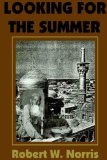Sociologists may debate the question but popular belief certainly holds that baby boomers, for whatever reason, were preoccupied with a search for enlightenment. While much of it was domestic exploration of Eastern culture and religions, so many Americans and Europeans journeyed from Europe through places like Turkey, Iran and Afghanistan on their way to India and Nepal in the late sixties and seventies that it gave rise to the term “hippie trail.” In Robert Norris’ semi-autobiographical novel Looking for the Summer, protagonist David Thompson journeys along the hippie trail. Yet while he is unquestionably on an introspective search for spiritual fulfillment, his journey into Iran and Afghanistan is as much by chance as design.
 Like Norris, Thompson joins the Air Force during the Vietnam War. Although stationed stateside, a misadventure earns Thompson a ticket to the war zone. Yet as the time for him to ship out approaches, he refuses and seeks conscientious objector status. He ultimately faces a court martial and is convicted of “willful disobedience”, serving a year in a military prison as a result. Although that decision predates the 1976-early 1977 time frame in which Looking for Summer is set, it remains at the core of the book. Among other things, the last words Thompson has with his father, who dies when Thompson is in prison, are a heated argument over that decision. Thompson also is not so dogmatic that he is certain his decision was one of principle and commitment to any particular cause or movement. While recognizing he was a “willing player” in his battle with the military, he wonders if he “merely aped the popular slogans and anti-authority behavior of the time” to hide being a coward.
Like Norris, Thompson joins the Air Force during the Vietnam War. Although stationed stateside, a misadventure earns Thompson a ticket to the war zone. Yet as the time for him to ship out approaches, he refuses and seeks conscientious objector status. He ultimately faces a court martial and is convicted of “willful disobedience”, serving a year in a military prison as a result. Although that decision predates the 1976-early 1977 time frame in which Looking for Summer is set, it remains at the core of the book. Among other things, the last words Thompson has with his father, who dies when Thompson is in prison, are a heated argument over that decision. Thompson also is not so dogmatic that he is certain his decision was one of principle and commitment to any particular cause or movement. While recognizing he was a “willing player” in his battle with the military, he wonders if he “merely aped the popular slogans and anti-authority behavior of the time” to hide being a coward.
Following his release from prison, Thompson heads for Europe. Ostensibly intending to write a novel, he is more engaged in escaping what he views as the “dubiousness” of American’s quest for material gain and trying to sort out his internal dilemmas. By chance, he meets Hasan and Ataullah, from Iran and Afghanistan, respectively, in the lobby of a Paris hotel. He becomes friends with them and later joins them in Switzerland. From there, David-jan, as Hasan and Ataullah call him, has a harrowing overland journey into Iran in a car Hasan intends to resell. When he inadvertently becomes a focus of the Shah’s security forces, he heads to Afghanistan to see Ataullah and then, ultimately, into India. (Lest you think their current prominence led Norris to pick Iran and Afghanistan as two of the main settings for the novel, the book was first published in Japan in 1996.) Throughout his journeys, Thompson ponders his life, philosophy and place in the world, often aided by marijuana, psilocybin or hashish and even acquires an opium addiction he must kick.
While the drug use certainly fits the times and locales, it is also perhaps singularly symbolic of one of the problems with Looking for Summer. Much of the dialogue has the sense of what the book calls “hash-inspired thought.” Other portions come off more as a discourse on history, the politics of the time, philosophy or religion. Although Norris is quite adept at description and setting scenes, there seems a penchant to instill too much substantive meaning or message in the conversations in the novel.
Additionally, a significant number of characters appear for a handful of pages — or paragraphs — and then apparently only to convey information about a particular subject, whether art or Jimmy Carter’s promise to grant a presidential pardon to those who avoided the draft during the Vietnam war by failing to register or fleeing the country. Other characters appear only by name and perhaps brief description and add nothing substantive to the plot, such as Thompson’s last housemates before he leaves Iran. Despite that, Norris, a professor at Japan’s Fukuoka International University, uses his power of description to elevate the core characters beyond convenient stereotype.
Although Thompson often is too self-absorbed to be a truly engaging protagonist, his prison term and the life-changing effects of his decision to refuse to go to Vietnam offer an uncommon angle on a search for insight and self-knowledge. Ultimately, though, the novel tries to cover perhaps too much philosophical ground and too many musings and those aspects of the book come off as a bit too prolix. Perhaps Norris is simply trying to point out that what he calls “philosophical rambling” is not as important as real-life experience. Yet had the observational skills he displays infused more of the book’s overall tone, it would have bolstered both the theme and its eloquence.
I’ve found no answer other than there is no answer.
Robert Norris, Looking for the Summer







